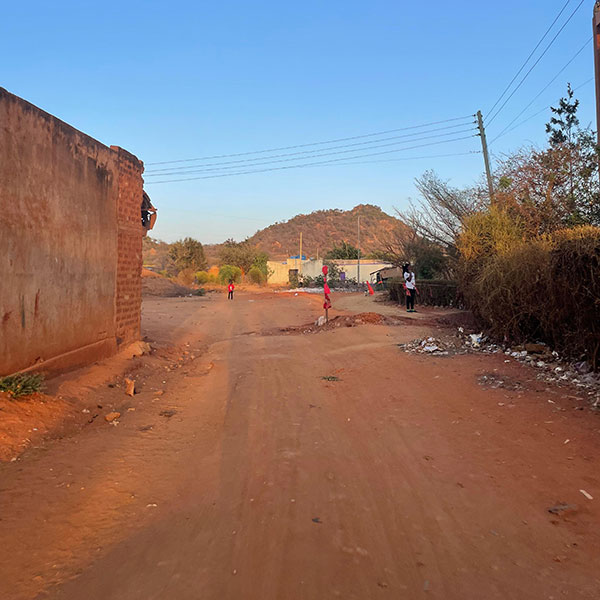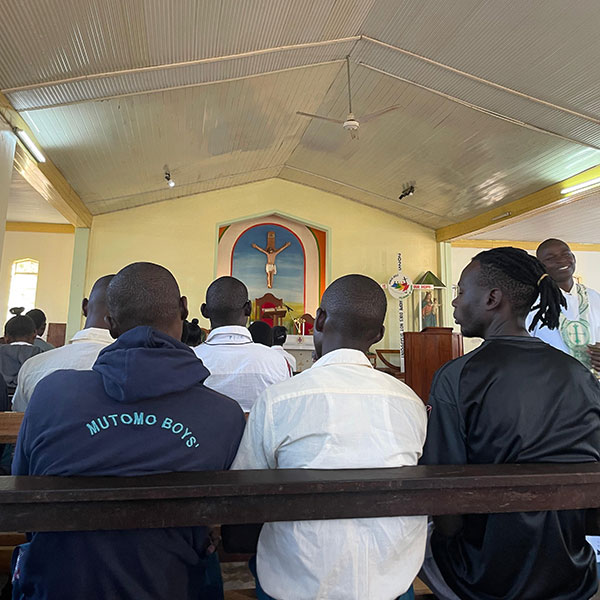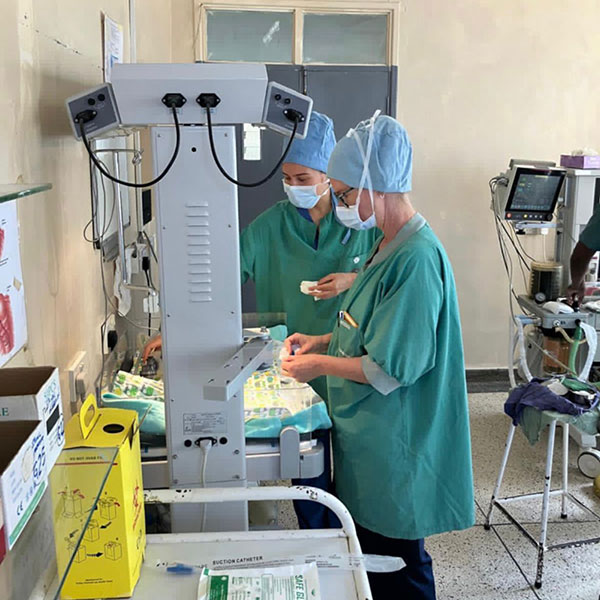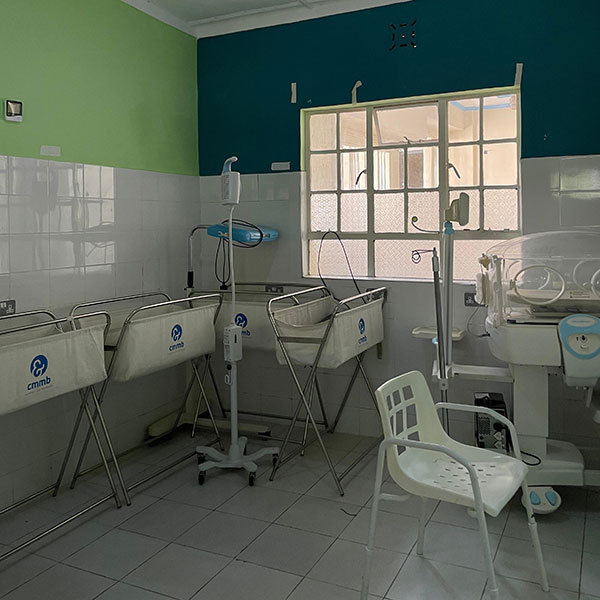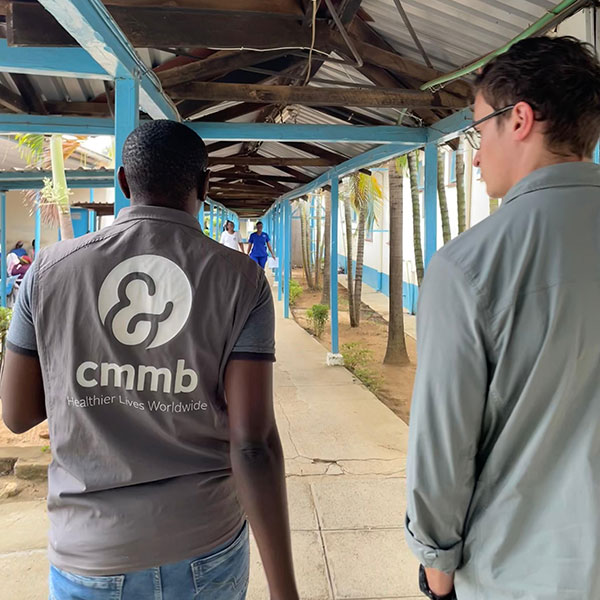Volunteer Reflection: The First Couple Months in Kenya
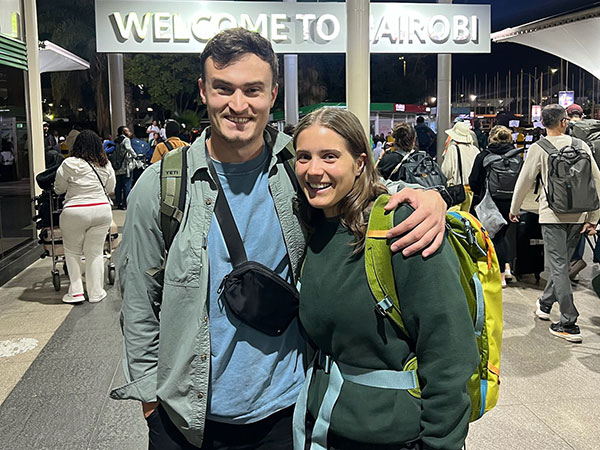
Guided by faith and a shared commitment to serve, CMMB volunteers embody our mission to bring healing and hope to those most in need. We invite you to hear from Ellen and Andrew, two volunteers serving in Mutomo, Kenya. Ellen is sharing her passion for neonates and their families as a nurse at the Mutomo Mission Hospital, and Andrew is helping to develop standard operating procedures and training to help the newborn units function more efficiently. Below, they reflect on their first months of service.
I hope this message finds you well! About two months ago, Andrew and I packed our bags and left the modern city of Austin, TX, to live in the rural town of Mutomo, Kenya. The trip spanned about 30 hours and over 8,000 miles, so it was quite the journey, or “safari,” as people say here. Before moving here, we spent over a year preparing, brainstorming, and interviewing with Catholic Medical Mission Board (CMMB), the organization we’re working with. Andrew and I knew well the stirring in both our hearts to embark on a new adventure and a life more centered around service. The past couple of months have been filled with new experiences, emotions, and difficulties. There are too many to capture in this brief update, but I hope that with this message, you’ll get a better understanding of how your support for this mission has impacted the lives of individuals and families here, as well as my own.
Life in Mutomo
Life in Mutomo is very different from life in America. The lifestyle is more relaxed and unhurried in comparison to the bustling city of Austin, TX, where efficiency and technology dominate daily life. About three and a half hours from the capital of Nairobi, Mutomo is a small, rural town in southern Kenya. The entire Mutomo subcounty area has a population of around 113,000, but the city of Mutomo itself is much smaller.
The weather is cool in the mornings and warm in the afternoons. Common daily sights include goats grazing, donkeys carrying water, people commuting to work via motorcycle, sometimes carrying two individuals and a child, women cooking meals in their roadside shops, and children walking to and from school. Andrew and I both agree that we’ve eaten more rice and beans here than we have in our entire lives. Rice and beans, along with cabbage, ugali, goat meat, potatoes, bananas, and chapati, are staple foods in this region, and they are all delicious. If you’ve never heard of ugali or chapati, I encourage you to look it up!
Walking around the town can be quite an experience as people here are always excited to talk with us and know where we’re from. Whenever we are in town, ‘Mzungu’ is a common phrase we hear while walking around. In Kiswahili, it means “someone who roams around” or “aimless wanderer” and is usually used in a lighthearted way to refer to foreigners or white people. Oftentimes, children just want to touch our hands or hear us speak because it’s different from what they see and hear every day. To get our attention, they’ll practice saying, “hi, how are you?!?,” and then giggle when we respond. We usually limit our trips into town to grocery shopping and Sunday Mass. When we’re not in the hospital, at the CMMB office, or on a late-night ambulance transfer, Andrew and I enjoy working out on the patio, cleaning the house, and grabbing a locally brewed Savanah Cider at a nearby restaurant.
Inside the Newborn Unit
During the work week, I spend my time primarily in the Newborn Unit (NBU). The NBU is in the maternity ward, which consists of labor and delivery, post-caesarean section, and post vaginal delivery patients. The hospital is severely understaffed, making it an impossible task for one maternity nurse to give uninterrupted attention to every single patient. There are often only one or two nurses to care for about fifteen to twenty patients at a time, not including their new baby, who they share the bed with.
Thankfully, this hospital has the benefit of having nursing students as a resource to help with completing daily tasks that the nurses simply don’t have time for. Sometimes students even perform tasks and procedures that a nurse would normally do. I’ve witnessed a second-year nursing student stitch up an episiotomy and it was amazing to see a young student’s courage to perform such an advanced procedure. I used to think that the hospital I worked at in Austin could use more nurses (which it still does), but now I see more clearly how detrimental it is to the quality of care given when a hospital is truly short-staffed.
Neonates are sometimes left unattended in the NBU, which is something Andrew and I aimed to fix at the start. Just like the Neonatal Intensive Care Unit (NICU) I worked in, these babies have critical and life-threatening diagnoses. The NBU is likely the most fatal unit in the hospital here, which makes it all the more important for us to focus on it. There is only one continuous monitoring device in the NBU, the thermometers are hard to come by, and until recently, the phone wasn’t working, making it difficult for staff and students to call for help in an emergency. Another obstacle the NBU and the hospital in general face is a lack of supplies. Sometimes, there are no gloves. Other times, the only available monitor has malfunctioned while you have a critical, oxygen-dependent neonate.
During these times when the equipment or resources are scarce, I have to take a deep breath and stretch my creative muscles to see if there are any other options that can help the baby. There is only so much the staff can do with the supplies they have. At times, that means that a baby will unfortunately not survive due to the lack of interventions available. For example, a ventilator for respiratory support is three and a half hours away in a hospital in Nairobi, and usually the family can’t afford the cost to transfer the baby via ambulance. As a result, the baby stays here in Mutomo with the hope that they will heal and recover, but that isn’t always the outcome.
The experience of losing a baby when it could have been prevented is incredibly difficult, but it has ultimately fanned the flame of love God has placed in our hearts to make sustainable changes in an area of the world that truly needs it.
In addition to the hospital, another experience Andrew and I had that reminded us of why we’re here was visiting the home of a wonderful woman named Mukeli. She’s a single mother of seven who is a survivor of cervical cancer, tuberculosis, and is living with HIV. She lives in an approximately nine-foot-by-nine-foot clay home with her children and lives off the equivalent of $35 USD per month. Despite this, she works every day for her kids with a smile on her face. It really puts into perspective the things we take for granted. Something simple, like a cold glass of water, new shoes, or a stove, is a luxury. It was really great to meet her and hear her story.
Embracing Each Day
Through all of our work, Andrew and I always remember the mission from CMMB to “do something different” and make everlasting change. We can not simply work an eight to five shift at the hospital for six months, only to leave everything the same as it was when we arrived. Along with the extremely dedicated team of students, nurses, doctors, and other professionals, we strive to address weak points within the current system to leave sustainable and lasting change when we depart. We kick off our mornings with a 6 a.m. kettlebell workout, followed by morning prayer and a breakfast of hard-boiled eggs. From there we go to work in the hospital and CMMB office.
It is easy to become overwhelmed by the large gaps in care we are trying to address. However, we focus on making steady progress each day and celebrating both big and small daily achievements. In everything, we strive to continue gaining trust and growing in friendship with the staff. We host training on important topics such as neonatal resuscitation, and provide assistance with patient assessment, treatment, and transport. Despite the challenges, something that always makes Andrew and me laugh is the baboons that dig in the community trash can right across from our front door! They’re the Kenya equivalent of raccoons in America, but definitely more dangerous. We have to find something to laugh about because finding humor wherever possible fosters resiliency and ultimately strengthens us for whatever may come!
Each day brings something new and sometimes very unexpected. Throughout these first couple of months, my heart continues to be drawn to God in new ways. Specifically, the Father has spoken to me through a little mango tree outside of the CMMB office. Mangos aren’t in season here until around December and January, right around the time we leave.
Our service, like the tree, is still growing, but is sure to continue on and bear beautiful fruit in the months to come. Only in due time, and after persisting through the changing seasons, will it sprout delicious, juicy mangos.
This truly keeps me going every day and is an image I hold onto. So, that’s the blog for now, but there is still so much more to come! Please pray specifically for inspiration on ways we can improve the hospital, and for courage to take the steps needed to implement positive change. Please follow Andrew and I’s joint Instagram account called @missioncribpossible, where we’re documenting this journey. Know that you are in my prayers, and thank you for all of your support!
